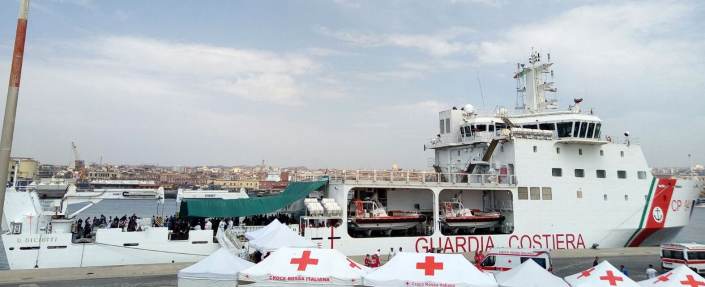Disappearing among the large numbers
They have reached the
port of Catania tonight, the survivors of the immense
tragedy of these days. 950 missing people to which are added new victims of the shipwreck
that happened in the Aegean Sea this night, and others scattered on the coasts of Libya. These
tragic numbers announced after the recent tragedies leave without words who for
months and years of talk and false promises has heard too many of them. But
it’s exactly this hypocrisy and opportunism of the official rhetoric that makes
it inevitable to give expression to testimonies of those who have a historical
depth in regard to the sensational news of the moment.
Ahead of the big
numbers is set in motion the press around the world and each institutional
representative feels, rightly, called into question, and in most cases almost
forced to throw suggestions and proposals often improvised, to cushion the
impact of such dramatic situations. The recent and increasingly frequent
shipwrecks lately also led to the spread of stories and testimonies about the
conditions of the departure of migrants, especially in camps in Libya. A major
step forward which has the merit of giving a more realistic geopolitical vision
of the migratory phenomenon, and which could eventually be connected to what migrants
and activists have denounced for years.
The same applies to
the descriptions of the journey in the sea. Last July, 49 migrants lost
their lives because of being trapped in the hold of a boat and since then it
seems that the distinction between travellers of first, second and third class
has never failed, with refugees that narrate the most atrocious things they
experienced at the time of boarding. “To me and other Gambians, they tied
arms and legs with our clothes so that more people could get in the hold. I
could not even wipe my vomit and I struggled to find some space to breathe. Other
Nigerians on my boat were tied up because the smugglers considered them being
too “restless” and thought they might create problems. If the boat
stops and no help arrives, on board can unleash hell and many throw theimselves
into the sea to put an end to it. I was lucky; my boat crossed a merchant vessel
and my trip lasted only 16 hours. For sure it would not have been the same if
we had to wait for the Coast Guard.’’ These are the words of L., who arrived in
Italy two months ago. Like him, hundreds of other stories allow us to have at
least a vague idea of what it means to across by boat. Survival is linked to destiny
and for the majority of Sub-Saharan, Eritrean, Sudanese, Pakistan and
Bangladeshi migrants even the journey that precedes the arrival at this moment
can end up in the worst way at any moment. Stories that disappear from the
news, however, focusing instead on more “sensational” news like the
alleged dispute between Muslims and Christians in the sea.
But in the game of
large numbers, it is easy to disappear. Even once having reached the mainland, since
the “organized” welcoming, still unjustifiably acting based on
emergency, provides mostly the transfer of migrants in already overcrowded
centres and mostly in Sicily. Indeed, there is an on-going on new arrivals and
transfers to Pala Nebiolo and the former barracks Bisconti in Messina; new
arrivals are also brought to Cara di Salinagrande and Pian del Lago, other to
Cas, recently opened and with questionable sustainability in the Syracuse area.
Not taking any position from the part of the prefecture of Ragusa, avoided only
a few days ago the prolonged concentration of nearly 500 migrants in CPSA of
Pozzallo. A decision which led to a long night of waiting outside the port for
300 migrants who had to wait for the partial transfer of those
who occupied the centre hours before, but now, with the latest transfers and new
arrivals on Sunday, the situation seems to be stabile with 150
people present. The option of large gatherings and the prevailing logic of
“economic” and not the protection of migrants, however, are evident
in the continued transfers of newcomers to Cara Mineo. The decision to allocate
the survivors of the shipwreck on Saturday was scandalous, right at the moment,
when the prosecutor
discloses investigations on an alleged international network of smugglers, suspected of being
among the “organizers” of the journey also ended in tragedy and that would
have a logistic base just inside the camp.
Migrants, most probably,
destined to become a number of thousands or hundreds of guests who gather in the
big centres, where the individual protection and confirmed by the power of law
becomes a luxury or a privilege for a few. The large numbers dazzle, play the game of who
appeals easily to the emergency, and especially conceal violations of
fundamental rights, such as individual and personalized medical, psychological,
legal and social assistance, migrants held for years awaiting a response in
these conditions. Not to mention the chance to build a new life path or to be integrated
in the host society: another point between the rights and obligations
pertaining to each person and sponsored by some of the managers of the “welcoming”, which is totally in
contradiction with the position and the structure of the same centres.
There is a lot to do,
now more difficult than ever, in order to avoid that in front of bigger and
bigger tragedies there is an even higher risk that the attention will be
focused only on the big numbers which are connected to people, or the transfer
of money that set in motion some logical doubts regarding aid and welcoming. We
have to recover humanity hidden in-between the numbers in order to be able to
react.
Lucia Borghi
Borderline Sicilia Onlus
Translation: Catherine
Scholz

